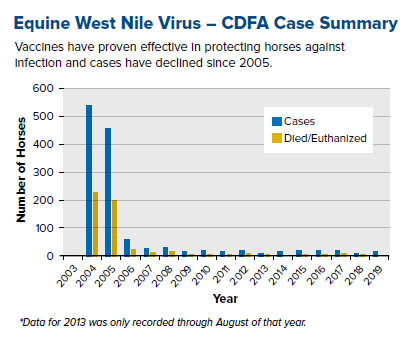West Nile virus (WNV) is a mosquito-borne virus that affects humans and other animals, of which horses represent 96.9% of non-human cases. Introduced to the United States in 1999, WNV is now found in all of the contiguous 48 states.

Mosquito vector graph showing cycle from bird to mosquito to humans and horses
First diagnosed in a horse in California in 2003, the state became the WNV disease epicenter in 2004, with 540 confirmed equine clinical cases and virus is now endemic and here to stay.
© 2017 by Department of Health New window.
The California Department of Food and Agriculture (CDFA) works with federal, state, and local agencies to monitor WNV in horses and minimize its impacts on the equine industry. West Nile virus is a reportable disease in California – cases must be reported to the CDFA within two days of discovery.
First diagnosed in a horse in California in 2003, the state became the WNV disease epicenter in 2004, with 540 confirmed equine clinical cases. The virus is now endemic, so it is here to stay.
Vaccines have proven effective in protecting horses against infection and cases have declined since 2005. The American Association of Equine Practitioners (AAEP) recommends WNV as a core vaccine.
Work with your veterinarian to ensure that your horse is properly vaccinated. Owners and facilities can further protect horses by practicing good mosquito control, including eliminating breeding sites by removing standing water, cleaning water containers and stocking water troughs with fish that feed on mosquito larvae.
It is also important to minimize exposure to mosquitoes through use of repellents and by stabling horses at peak mosquito feeding periods (dawn and dusk).
Graph below shows yearly drop in Equine West Nile cases since 2005 as a result of effectuve vaccination programs.

